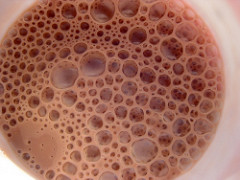Calcium Carbonate: Almond and Soy Milk
by Susan Lesch. January 25, 2017

Unfortified almond milk

Fortified almond milk
In October 2016, a study at Johns Hopkins concluded that calcium supplements might be harmful. Because my bone health nurse has been adamant that calcium will solve osteopenia, I was faced with a bottle of Citrical and an idea that perhaps I could find my calcium in food. After trying chocolate milk, I found Almond Breeze unsweetened chocolate almondmilk. It seemed to be a perfect solution and somewhat of a treat, with less than one third the calories of skim cow's milk.
A week later, I became violently ill with constipation. It took over a week to recover. I remembered then that calcium carbonate supplements had also made me sick (that's why I used calcium citrate or Citrical instead). A little bit of Googling found that calcium carbonate is the cheapest form of calcium, and that it can cause constipation in some percent of the population (the opinion of these Yale M.D.s notwithstanding [1]).
I earned a certificate in Plant-Based Nutrition at eCornell, and can tell you that dairy foods are not recommended. But both almondmilk and soymilk have added calcium carbonate to compete with dairy. My conclusion? Fortification of foods is a blessing sometimes but it is not without its critics. Please don't fortify food products with materials that create health problems.
[1] Evidence does not exist that calcium carbonate causes constipation, according to Clemens, John D., M.D., and Feinstein, Alvan R., M.D. (1977). Calcium Carbonate and Constipation: A Historical Review of Medical Mythopoeia. Gastroenterology Vol. 72, No. 5, Part 1, pp. 957-961. Retrieved on January 25, 2017 from http://www.gastrojournal.org/article/S0016-5085(77)80220-5/pdf.
